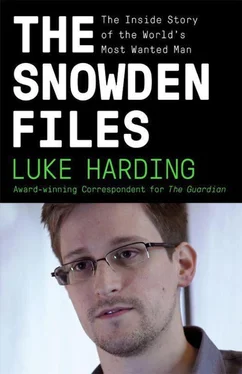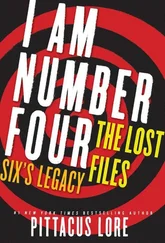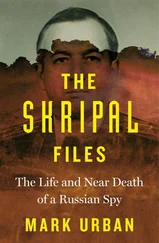The pair reached the alligator ahead of schedule. They sat down. They waited. Greenwald briefly pondered whether the alligator had some significance in Chinese culture. He wasn’t sure. Nothing happened. The source didn’t show. Strange.
If the initial meeting failed, the plan was to return later the same morning to the same anonymous corridor, running between the Mira’s glitzy internal shopping mall and one of its restaurants. Greenwald and Poitras came back. They waited for a second time.
And then they saw him – a pale, spindle-limbed, nervous, preposterously young man. In Greenwald’s shocked view, he was barely old enough to shave. He was dressed in a white T-shirt and jeans. In his right hand he was carrying a scrambled Rubik’s cube. Had there been a mistake? ‘He looked like he was 23. I was completely discombobulated. None of it made sense,’ Greenwald says.
The young man – if indeed he were the source – had sent encrypted instructions as to how the initial verification would proceed:
GREENWALD: What time does the restaurant open?
THE SOURCE: At noon. But don’t go there, the food sucks…
The exchange was faintly comic. Greenwald – nervous – said his lines, struggling to keep a straight face.
Snowden then said simply: ‘Follow me.’ The three walked silently towards the lift. No one else was around – or, at least, nobody they could see. They rode to the first floor, and followed the cube-man to room 1014. He opened the door with his swipe card, and they entered. ‘I went with it,’ Greenwald says.
It was already a weird mission. But now it had acquired the feel of a wild-goose chase. This thin-framed student type was surely too callow to have access to super-sensitive material? Optimistically, Greenwald speculated that possibly he was the son of the source, or his personal assistant. If not, then the encounter was a waste of time, a hoax of Jules Verne proportions.
Poitras, too, had been secretly communicating with the source for four months. She felt she knew him – or at least the online version of him. She was also struggling to adjust. ‘I nearly fainted when I saw how old he was. It took me 24 hours to rewire my brain.’
Over the course of the day, however, Snowden told his story. He was, he said, a 29-year-old contractor with the National Security Agency. He had been based at the NSA’s regional operations centre in Kunia on the Pacific island of Hawaii. Two weeks ago he had quit his job, effectively abandoned and bid farewell to his girlfriend, and secretly boarded a flight to Hong Kong. He had taken with him four laptops.
The laptops were heavily encrypted. But from them Snowden had access to documents taken from NSA and GCHQ’s internal servers. Tens of thousands of documents, in fact. Most were stamped ‘Top Secret’. Some were marked ‘Top Secret Strap 1’ – the British higher tier of super-classification for intercept material – or even ‘Strap 2’, which was almost as secret as you could get. No one – apart from a restricted circle of security officials – had ever seen documents of this kind before. What he was carrying, Snowden indicated, was the biggest intelligence leak in history.
Greenwald noticed the accumulated debris of many days of room service – trays, abandoned bowls of noodles, dirty cutlery. Snowden said he had ventured out just three times since checking into the Mira under his own name a fortnight earlier. He sat on the bed as Greenwald bombarded him with questions: where did you work, who was your boss in the CIA, why? Greenwald’s credibility was on the line. So was that of his editors at the Guardian . Yet if Snowden were genuine, at any moment a CIA SWAT team could burst into the room, confiscate his laptops, and drag him away.
Snowden, they began to feel certain, was no fake. His information could well be real. And his reasons for becoming a whistleblower were cogent, too. His job as a systems administrator meant – he explained lucidly, persuasively, coolly – that he had a rare overview of the NSA’s extraordinary surveillance capacities, that he could see the dark places where the agency was going.
The NSA could bug ‘anyone’, from the president downwards, he said. In theory the spy agency was supposed to collect only signals intelligence on foreign targets, known as SIGINT. In practice this was a joke, Snowden told Greenwald: it was already hoovering up metadata from millions of Americans. Phone records, email headers, subject lines, seized without acknowledgement or consent. From this you could construct a complete electronic narrative of an individual’s life – their friends, their lovers, their joys, their sorrows.
Together with GCHQ, the NSA had secretly attached intercepts to the undersea fibre-optic cables that ringed the world. This allowed the US and UK to read much of the globe’s communications. Secret courts were compelling telecoms providers to hand over data. What’s more, pretty much all of Silicon Valley was involved with the NSA, Snowden said – Google, Microsoft, Facebook, even Steve Jobs’s Apple. The NSA claimed it had ‘direct access’ to the tech giants’ servers.
While giving themselves unprecedented surveillance powers, the US intelligence community was concealing the truth about its activities, Snowden said. If James Clapper, the director of national intelligence, had deliberately lied to Congress about the NSA’s programs, he had committed a felony. The NSA was flagrantly violating the US constitution and the right to privacy. It had even put secret back doors into online encryption software – used to make secure bank payments – weakening the system for everybody.
As Snowden told the story, the NSA’s behaviour seemed culled from 20th-century dystopian fiction. It was recognisable from the writings of Aldous Huxley or George Orwell. But the NSA’s ultimate goal seemed to go even further: to collect everything from everybody, everywhere and to store it indefinitely. It signalled a turning point. It looked like the extirpation of privacy. The spy agencies had hijacked the internet – once a platform for individuality and self-expression. Snowden used the word ‘panopticon’. This was a significant coinage by the 18th-century British philosopher and codifier Jeremy Bentham. It described an ingenious circular jail where the warders could see the prisoners at all times, without their knowing if they were being observed.
And this, Snowden asserted, was why he had decided to go public. To throw away his life and career. He told Greenwald he didn’t want to live in a world ‘where everything that I say, everything that I do, everyone I talk to, every expression of love or friendship is recorded’.
Over the coming weeks, Snowden’s claims would ignite an epochal debate. They would enrage the White House and Downing Street. And they would cause international havoc, as Snowden slipped out of Hong Kong, attempted to gain asylum in Latin America, and got stuck in Vladimir Putin’s Moscow.
In America and Europe (though not at first in the Britain of James Bond), there was a spirited argument about the right balance between security and civil liberties, between freedom of speech and privacy. Despite the febrile polarisation of US politics, right-wing libertarians and left-wing Democrats joined together to support Snowden. Even President Obama conceded the debate was overdue and reform was required. Though this didn’t stop US authorities from cancelling Snowden’s passport, charging him with espionage and demanding his return from Russia.
The fight to publish Snowden’s story was to present the journalists themselves with dramatic problems – legal, logistical, editorial. It pitted a famous newspaper, its global website and a few media allies against some of the most powerful people on the planet. And it would lead to the destruction of the Guardian ’s computer hard drives in an underground basement, watched over by two British GCHQ boffins. The machine-smashing was to be a particularly surreal episode in the history of western journalism and its battles against the state.
Читать дальше












